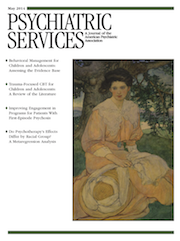Implementation of Evidence-Based Psychotherapies for Posttraumatic Stress Disorder in VA Specialty Clinics
Abstract
Objective
The U.S. Department of Veterans Affairs (VA) has engaged in substantial efforts to promote the use of evidence-based psychotherapies for posttraumatic stress disorder (PTSD). The authors evaluated the effectiveness of these efforts.
Methods
This study used a cross-sectional, mixed-methods evaluation of treatment provided by the VA at specialty PTSD clinics in New England during the first six months of fiscal year 2010. Natural language processing algorithms were applied to clinical notes to determine utilization of evidence-based psychotherapy (prolonged exposure therapy and cognitive-processing therapy) among patients who were newly diagnosed as having PTSD. Data regarding efforts to implement evidence-based psychotherapy and other clinic characteristics were obtained through qualitative interviews with clinical and administrative staff (N=30), and the Promoting Action on Research Implementation in Health Services framework was used to identify clinic factors associated with use of evidence-based psychotherapy.
Results
Six percent of patients (N=1,924) received any sessions of an evidence-based psychotherapy for PTSD (median=five sessions). Several clinic factors were associated with an increased rate of implementation, including prior experience with use of the treatments, customization of training, and prolonged contact with the implementation and training team. Facilitation with broad training goals and clinics with highly organized systems of care were negatively associated with implementation.
Conclusions
Few patients with PTSD received evidence-based psychotherapy for PTSD during their first six months of treatment at a VA specialty PTSD clinic. The implementation framework poorly predicted factors associated with uptake of evidence-based psychotherapy. These results suggest that additional research is needed to understand implementation of evidence-based therapy in mental health settings.



